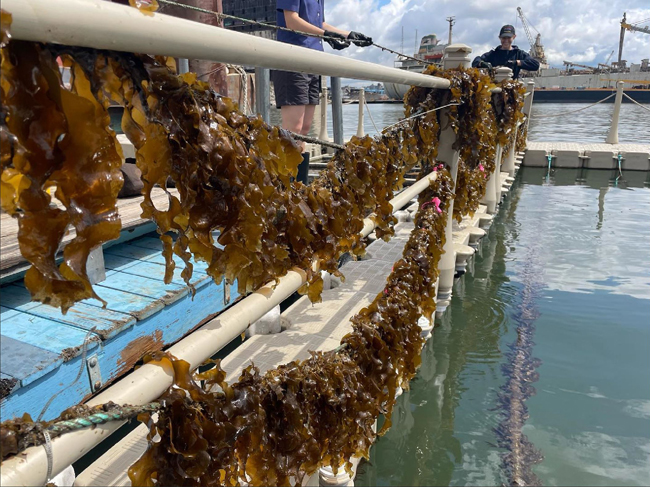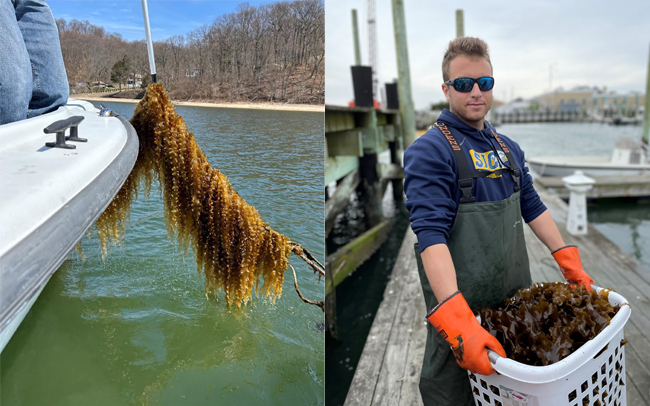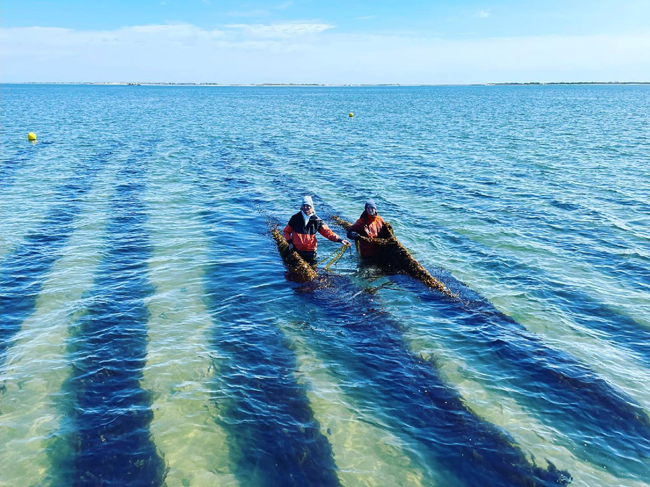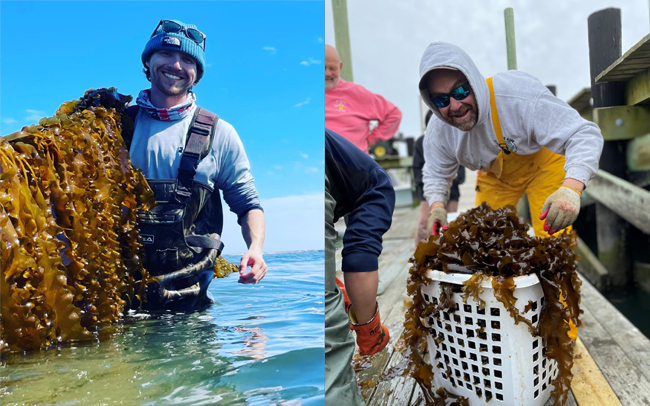
2023 kelp harvest at RETI Center, Gowanus Bay Terminal. Credit: Lazy Point Farms
Contacts:
Wendy Moore, Executive Director, Lazy Point Farms, E: kelp@mooregood.org
Michael Ciaramella, NYSG Seafood Safety & Technology Specialist, P: 631-632-8730, E: mc2544@cornell.edu
New York, NY, May 10, 2023 - Lazy Point Farms, a project of the Moore Family Charitable Foundation, is excited to announce the end of the third harvest season focused on supporting the fledgling sugar kelp industry in New York through direct grants and supporting operations. This season, the project had the opportunity to work with seven partners from across local government, environmental groups, oyster growers, and small business owners interested in the cultivation, processing, and productization of NY-grown kelp.
Kelp is one of the fastest-growing organisms on the earth and consumes nitrogen and carbon from both natural and human-generated sources without the need for fertilizer, arable land, or water. This makes it one of the cheapest, most efficient, and lowest maintenance ways to sequester or repurpose elements that have been introduced into our environment, while also becoming more effective to cultivate as we see the downstream impacts of climate change. It is a natural ecosystem builder and storm surge barrier and relies on the ocean as its only growth medium. For oyster growers and other aquaculturists, it is a perfect off-season crop to add to their business with minimal reconfiguration.
Sugar kelp grown in New York’s clean certified waters can be marketed for food. Kelp can and is grown for a variety of other end products ranging from fertilizers to cosmetics, and other materials derived from its extracts. In essence, it is the perfect crop for this modern time.

(at left) Checking healthy growth in early February 2023 in the waters of Huntington and Northport on Long Island (at right) Town of Hempstead employee Anthony Desousa carry kelp harvested from Town Marina. Credit: Lazy Point Farms
Commercial cultivation of seaweed is welcome in Long Island’s townships with off-bottom cultivation lease or license programs. Additional townships are considering such programs, so more waterbodies will be available for kelp cultivation soon. Recent legislation expanded commercial cultivation dramatically by adding Peconic and Gardiners Bays. Suffolk County is developing a lease program and expects many of its oyster farmers to apply.
Lazy Point Farms is focused on kickstarting what has become a thriving and self-sustaining industry in countries like South Korea, China, Iceland, and more recently in parts of the US like Maine and Alaska by providing direct support to bolster the industry until it is stable and thriving. As always, what is most important is the impact our partners are having.

Violet Cove Oyster employees check the growth on kelp lines shortly before harvest time. Credit: Lazy Point Farms
The Lazy Point Farms project was created precisely to support the development of the industry in a conscious manner. Wendy Moore, the Co-Founder of Lazy Point Farms, is “grateful to be working with both individual growers and a number of towns and local volunteer organizations who share our passion for strengthening communities with viable solutions. We see our approach as an opportunity for towns to own their most urgent opportunities; by supporting their own farmers and organizations, they can process kelp for their local parks and companies in their districts, thereby weaving this incredible resource into local policy and practice.”

(at left) Violet Cove Oysters employee Tyler Rochen shows off some kelp harvested this year; (at right) Brian Marcote harvesting kelp in Hempstead Bay. Credit: Lazy Point Farms
Below are thoughts about the future of kelp from some of those involved in making that future a reality ...
Assemblyman Fred W. Thiele Jr. of Sag Harbor, who has been championing the industry for years, also vocally indicated his support for allowing commercial kelp cultivation: “I was proud to sponsor legislation enacted in 2021 that permits state bottom lands in the Peconic and Gardiners Bays to be leased for kelp cultivation and continue to support the expansion of that program to other marine waters of the State. The kelp harvests we celebrate today are proof that New York should further encourage this fledgling industry. Not only does kelp create jobs and strengthen our marine industries, it is a key tool to fight climate change and restore water quality.”
Garrett Chelius, Deputy Director of Maritime Services, Town of Huntington and James Wylie, Project Coordinator of the Huntington-Northport Oyster Reef Project, are leading a public/private partnership between the Town of Huntington, Local Rotary Clubs, and Cornell Cooperative Extension of Suffolk County Marine Program (CCE) intended to improve water quality, restore habitat and support aquaculture efforts. Garrett recently described how as a result of the partnership with Lazy Point Farms, “We harvested hundreds of pounds of healthy kelp in late April!” James told us that, “Once it is dried and shredded, the town intends to use the kelp as organic fertilizer in its parks.” Huntington, Rotary, and CCE plan to scale up this effort modestly next winter with at least 10 lines strategically located throughout its many embayments.”
Dave Gugerty, who has a site thanks to the Village of Bayville, also described how they were able to put to use the juvenile kelp that Lazy Point Farms provided to grow sugar kelp that could be used for agricultural purposes and to improve water quality “in and around Mill Neck Creek and Oyster Bay Harbor. This improves water quality for swimming, paddle boarding, kayaking and other passive uses of our beautiful embayments ... the harvested kelp is to be used as a soil amendment on local municipal rain gardens and indigenous plant gardens thus completing the natural cycle.”
Led by Town of Hempstead Supervisor Don Clavin, the Town’s Department of Conservation & Waterways has been cultivating sugar kelp in Hempstead’s waters and refining kelp seed spool techniques in their aquaculture hatchery for several years. Clavin’s department understands seaweed’s environmental value and its potential end uses. The Town of Hempstead began its efforts as part of NYS DEC’s bioextraction initiative and has since expanded its cultivation with the help of Lazy Point Farms. “As the largest township in America that is home to many seaside communities, the Town of Hempstead has a responsibility to lead by example in protecting the local environment and delicate ecosystems of marine life and local waterways. In addition to growing kelp in our marinas during the winter season, we have also supported the community by aiding local garden clubs and high schools with their own kelp initiatives. We look forward to receiving our recently harvested kelp back from Lazy Point Farms, ground and dried for use as a soil amendment, to beautify the Town's parks and gardens in an environmentally conscious way" said Supervisor Clavin.
Sarah Lansdale, Commissioner of Economic Development and Planning, Suffolk County sees the potential for a robust kelp industry in New York, and described the efforts Suffolk County is making to ensure that the industry is established on solid ground while balancing local stakeholder interests, stating “I'd like to congratulate Lazy Point Farms on another successful harvest and note that Suffolk County sees the potential for seaweed being a gamechanger for the economy and environment for the East End."
"With increased interest in building a commercial seaweed industry in New York, Sea Grant has been working to provide clarity and support around the processing and marketing of seaweed as food," Mike Ciamarella of Cornell Cooperative Extension and New York Sea Grant described his organization's efforts to develop industry educational resources. "Initial efforts resulted in the creation of a regulatory guide and two supplemental resources providing clarity around processing and selling seaweed products as food in New York. More recently we have initiated the Seaweed Food Safety Training Workgroup working toward the development of a seaweed food safety training program to ensure that seaweed industry workers follow food-safe harvest procedures."
For the past three years, Lizzie Savage of the Hart Shellfish Company has been partnering with the organization and using her family oyster and clam hatchery as a nursery for kelp spores to create the spools that Lazy Point Farms distributes to growers. As someone that needs high-quality seawater to successfully cultivate shellfish seed, she takes water quality very seriously. Lizzie is “proud to have been able to be part of the Lazy Point Farms project. We live here and we have a responsibility to the land and the water and our neighbors.”
Sue Wicks of Violet Cove Oyster has been growing oysters in Great South Bay on a site leased from the town of Brookhaven. Her farm is in pristine waters near an ocean inlet and is adjacent to a nature preserve. Sue is interested in diversifying her crop and because sugar kelp is grown primarily in the winter months and requires little management, it can be grown successfully while complementing and improving the oyster efforts. “As a small business owner, I see a lot of potential in growing native seaweed like sugar kelp side by side with shellfish and am excited for the opportunity to grow sugar kelp commercially.”
Tim Gilman-Sevcik of the RETI Center, who promotes environmental justice and works toward achieving cleaner waterways for New York described his organization's first year growing sugar kelp. “Without the support and encouragement of [Lazy Point Farms] we might not have made it through our first season. Getting into a boat in February and checking the lines was a challenge, but to see the growth week after week was thrilling. It was quite a success, and next year we're planning to quadruple our farm. Our plan is to turn the seaweed into a cement substitute as a way of reducing carbon emissions and sequestering the heavy metals polluting our urban waters.”
Shanjana Mahmud, Luke Eddins & Nick Russell of the Newtown Creek Alliance completed their second year of cultivating sugar kelp in Newtown Creek, a Superfund site between Queens and Brooklyn. This year, they expanded to nine lines at five sites in the creek. "We want to explore all the potential benefits of seaweed aquaculture in urban waters from nutrient bioextraction for habitat creation and community engagement." This May, they are leading a series of boat tours to bring the public out to their sites.
David Berg, an advisor to Lazy Point Farms, is collaborating with scientists from New York and Maine as well as regulators, public officials, and others to help build this industry. He said, “I am inspired by the enthusiasm for kelp we see in the potential markets, by the public, by our oyster farmers, and on the part of our public officials.”
More Info: New York Sea Grant
New York Sea Grant (NYSG), a cooperative program of Cornell University
and the State University of New York (SUNY), is one of 34 university-based
programs under the National Oceanic and Atmospheric Administration’s
National Sea Grant College Program.
Since 1971, NYSG has represented a statewide network of integrated
research, education and extension services promoting coastal community
economic vitality, environmental sustainability and citizen awareness
and understanding about the State’s marine and Great Lakes resources.
Through NYSG’s efforts, the combined talents of university scientists
and extension specialists help develop and transfer science-based
information to many coastal user groups—businesses and industries,
federal, state and local government decision-makers and agency managers,
educators, the media and the interested public.
The program maintains Great Lakes offices at Cornell University, SUNY
Buffalo, SUNY Oswego and the Wayne County Cooperative Extension office
in Newark. In the State's marine waters, NYSG has offices at Stony Brook
University in Long Island, Brooklyn College and Cornell Cooperative
Extension in NYC and Kingston in the Hudson Valley.
For updates on Sea Grant activities: www.nyseagrant.org has RSS, Facebook, Twitter, Instagram, and YouTube links. NYSG offers a free e-list sign up via www.nyseagrant.org/nycoastlines for its flagship publication, NY Coastlines/Currents, which is published quarterly.